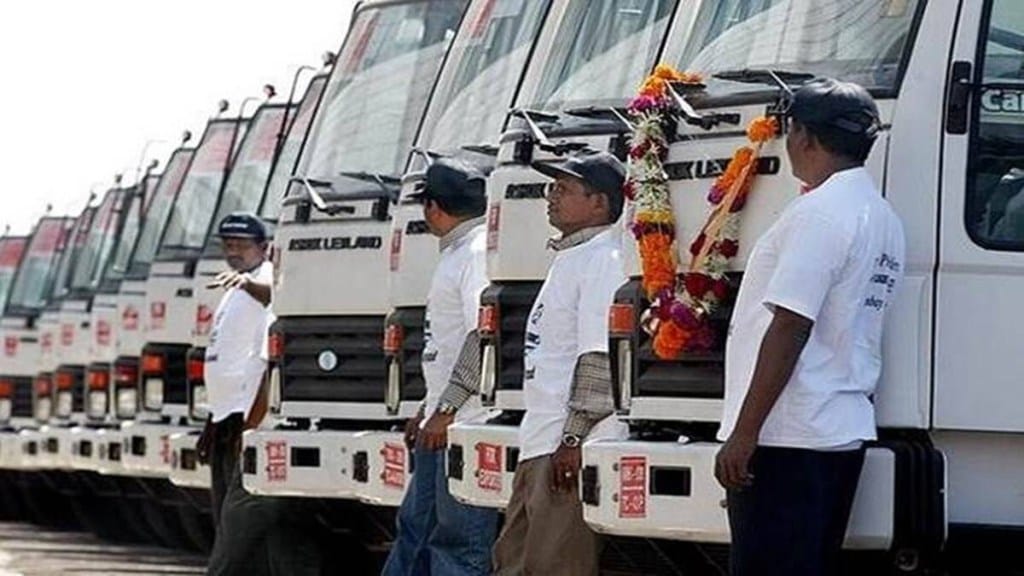Ashok Leyland plans to commercially roll out hydrogen-powered trucks by 2027. The potential benefits of high energy efficiency and extended range have led to commercial vehicles manufacturers testing trucks powered by hydrogen combustion engines, explains Swaraj Baggonkar.
l How hydrogen powers vehicles?
Hydrogen is a high energy and highly combustible fuel but is also known to be the cleanest form of energy. Vehicles powered by hydrogen are powered by electricity that is generated from built-in fuel cells. These fuel cells turn hydrogen atoms into electricity and water molecules. These are also known as fuel cell electric vehicles (FCEV) as the electricity powers the electric motors.
Besides emitting harmful tailpipe gases, traditional internal combustion engines that use petrol, diesel or natural gas for energy are less efficient than hydrogen whose only byproduct is water. While FCEV has turned out to be a popular clean technology choice for cars, makers of commercial vehicles have been developing and testing trucks powered by hydrogen combustion engines where hydrogen is the fuel which replaces diesel. As India works toward its goal of net-zero emissions by 2070, cutting carbon emissions from transportation has become crucial. Hydrogen thus stands out as a strong potential alternative due to its clean fuel reputation and high energy efficiency.
l Is hydrogen better than EV?
Both hydrogen and battery electric (EV) technologies are environment friendly alternatives to traditional petrol and diesel vehicles but both have their pros and cons. At `0.8 to `1.2 per kilometre (km), EVs are the cheapest to run compared to any other powertrain type. Their range limit depends on the size of the battery. Typically, a midsize battery on an electric car can provide a range of 400-500 km before it needs to be recharged. In comparison, hydrogen is a much more expensive fuel. Though hydrogen fuel is not commercially available in India for vehicles, it is estimated that the running cost of a hydrogen-powered car will be `4 per km. But the biggest advantage of hydrogen is the drive range it offers. The FCEV Toyota Mirai can run for 650 km without refuelling. High energy density, greater payload capacity, and faster refueling times compared to battery EVs are other advantages.
l The worldwide experience
Starting with just one country (Japan) in 2017, today more than 45 countries have devised or have published hydrogen strategies for mobility needs. Japan has set a target of 800,000 FCEVs and 900 hydrogen refueling stations by 2030. In the US, hydrogen refueling stations are primarily centered in California and that is why FCEVs have a restricted demand.
In Europe, the spread of hydrogen has been slow. Germany saw closure of 22 fuel stations, bringing down the number to 90. But in France, from 80 in 2025, the number of hydrogen fuel stations are set to go up with 91 more under construction. China boasts having the largest network of such fuel stations at 540, exceeding its 2025 target. But according to global market research firm SNE Research, global FCEV sales fell 38% in 2024 to 12,866 as against 20,704 sold in 2023.
l Why CV makers are interested?
While Toyota is the pioneer of FCEV technology development, companies like BMW, Honda and Hyundai are also offering FCEVs. Jaguar Land Rover and Ineos are developing FCEVs too. Mercedes-Benz has abruptly halted development of FCEV technology.
But while the car industry is going slow on hydrogen technology, the fuel is making faster inroad in the truck and bus space. Not only global brands such as Daimler, Volvo and Hyundai, home-grown brands such as Tata Motors and Ashok Leyland have either started advanced research on hydrogen vehicles or have already deployed them on the roads. Given the ability to travel long distances with better efficiency, bringing better economies of scale, hydrogen is gaining popularity among the Indian commercial vehicle makers. More than 85% of all goods in India are transported by road.
l Is there a government impetus?
In the recently announced reforms in the Goods and Services Tax (GST) regime, hydrogen vehicles received a rate reduction to 5% from 12%. This has brought it on par with electric vehicles which are also housed under the 5% GST bracket.
The central government launched the nearly `20,000-crore National Green Hydrogen Mission in 2023 which aims to make the country a global hub for green hydrogen production. The mission aims to achieve a production capacity of 5 million tonne per annum by 2030, foster indigenous manufacturing, create jobs, and decarbonise various sectors.
Earlier, the ministry of new and renewable energy (MNRE) had issued guidelines for implementing pilot projects in the transport sector under this mission. Proposals were invited for different types of hydrogen-based vehicles, routes, and hydrogen refuelling stations. After detailed scrutiny, MNRE sanctioned five pilot projects consisting of 37 vehicles (buses and trucks), and nine hydrogen refuelling stations.
